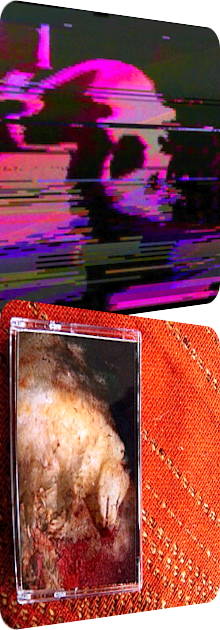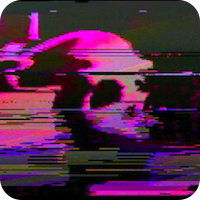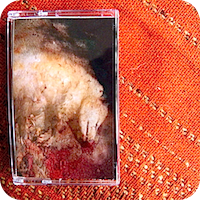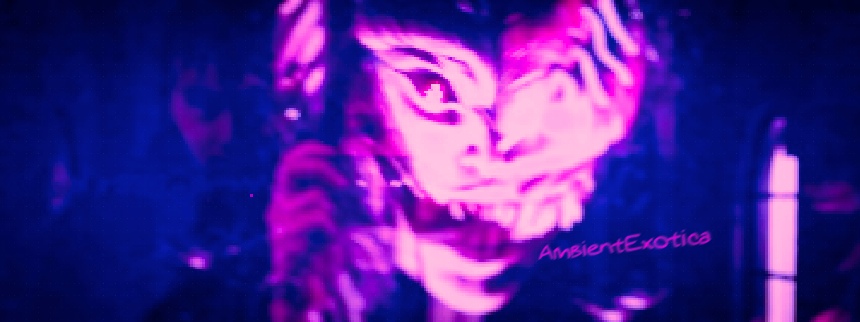
Derek M. Poteat
Guilt
2013
Andy Loebs
Hibernation Sickness
2013
What follows right in the opening paragraph is an important disclaimer regarding AmbientExotica and the state of many a magazine and music blog in general, one which will someday be carved out in greater detail: I usually refrain from placing multiple – or even just two – reviews on one page. It is a neat idea and saves the reviewer time, but has several disadvantages at once, all of them lessening the impetus of an artist's vision, or worse, eventually harming the artist himself, I believe, for he is featured with friends, foes and projects unrelated or unknown to him. So what, that's the way it has always been, ever since modern music journalism came to be. And lists as well as retrospectives obviously depend on the merging of many artists on one page; this is commonly accepted and embraced, even by me. I still handled things differently when this website launched and have not changed a thing since then: every musician, band or collective who appears on AmbientExotica deserves the right to be featured on their own dedicated page and in-depth, for it does not cost me anything to simply add a new one. Gone are the disadvantages of glossy magazines where each additional page costs almighty dollars which causes the crammed amalgamation of various artists on one single page, with about five lines dedicated to each review. But now it comes down to this: yes, with this review, I have succumbed to these tactics as well.
My reasons to feature Derek M. Poteat and Andy Loebs on the same page are hopefully justifiable. These gentlemen are used to each other's presence anyway: both hail from Asheville, North Carolina, release music on fellow Matthew Barlow’s Twin Springs Tapes music cassette label and form a trio infernale called Death Mission To Space with the label boss. So what I am doing is only natural and should not be seen as a violation against my own principles. But even if this is indeed the case, it is still a proper in-depth review. Bassist Derek M. Poteat's Guilt (May 2013) is an audaciously danger-evoking and hopeless bass manifesto that is envisioned with only one instrument, a bass guitar. Similarly, multi-instrumentalist Andy Loebs' Hibernation Sickness (August 2013) is also solely created with one particular instrument, the Roland Juno 60 synthesizer which allows him to take the listener on a flight through cosmic retro dioramas in space. The reviewed material sits on the opposite sites of the spectrum, but both artists are perfectly capable of pushing the emotions forward, and as stale as that sentence may sound, it is true. While Poteat's Guilt is more akin to the partially toxic-metallic atmosphere in Matthew Barlow's & Andy Loebs' ode to Twin Peaks and first ever Twin Springs Tapes release called Northwest Passage (2013), it is Andy Loebs' solo work Hibernation Sickness which is more related to Riot Meadows' aka Steve Targo's Natural Circuitry (2013), not coincidentally the second release on the label. Poteat and Loebs provide tapes number 3 and 4, and without further ado, let us dive into their characteristic traits and timbres. On the same page. La-di-da.
"I want the listener to feel every note – emotionally and physically," says Derek M. Poteat in the liner notes, and while this very sentence could occur in a lot of memes and pictures on the internet, for example below the likeness of Yma Sumac or Tay Zonday (both of whom, not entirely coincidentally, cover the respective ends of the frequency spectrum), Poteat is, as the cover so splendidly shows, dead serious about his ambition. The bass ought to do it, and the only remaining question is what this particular it really means. 57+ minutes of subsonic bass, warped frequencies and abyssal ravines await the listener, and the first few seconds of Guilt (Side A) emanate exactly that: serpentine fluxions of pitch-black molecules. Rather than letting the atmosphere unfold via a genteel fade-in phase, Asheville’s erudite bassist starts in medias res, with the basic flow of the track already in place. Bass flumes akin to galactic wasps or arcane dragonflies buzz through the vaulted forsakenness, sawtooth-like and stereo-panned. The listener does not need to pay extra for these effects, as they are integrated pro bono. Shuttling between daemonic dungeons and elasticized power coils, it already turns out in the beginning stages that Guilt is properly named. Good equipment at home carves out the most of this anacrusis, as the swirling riverbeds in the 40hz range can fully unfold when no limit whatsoever is reached.
ought to do it, and the only remaining question is what this particular it really means. 57+ minutes of subsonic bass, warped frequencies and abyssal ravines await the listener, and the first few seconds of Guilt (Side A) emanate exactly that: serpentine fluxions of pitch-black molecules. Rather than letting the atmosphere unfold via a genteel fade-in phase, Asheville’s erudite bassist starts in medias res, with the basic flow of the track already in place. Bass flumes akin to galactic wasps or arcane dragonflies buzz through the vaulted forsakenness, sawtooth-like and stereo-panned. The listener does not need to pay extra for these effects, as they are integrated pro bono. Shuttling between daemonic dungeons and elasticized power coils, it already turns out in the beginning stages that Guilt is properly named. Good equipment at home carves out the most of this anacrusis, as the swirling riverbeds in the 40hz range can fully unfold when no limit whatsoever is reached.
After approximately seven minutes, the second phase is reached, comprising of a slowly pulsating one-note heartbeat. In contrast to this frighteningly absorbing hopelessness, John Williams’ main theme for Jaws may sport a second note, but is spoilt by the aura of Hollywood and the collective memory of one too many people. Poteat’s brutish arch is much more, er, bone-emptying, for the dead black nucleus is later ameliorated by frizzling static noise helixes. The scariest phenomenon of this section is that the bassist does not let loose a mayhem or turmoil. Everything appears orderly, perversely silky and in the right ballpark. Heck, this pernicious scenery drones along so peacefully that a kind of sick contemplation sets in. It is only after 13 minutes that heavily hissing alkaline protrusions splutter their hazardous neon-mauve gradient into the aural air, sounding like bit-crushed thunderstorms of yore. These are the foreboders of the hefty things to come, namely classically plucked electric guitar riffs. Poteat unchains a few ferocious tone sequences and ennobles their expectorated extirpation with an unbelievable dryness. High volume levels augment this segue and let it reach even lower spheres of brazen clangs and thuggish tendrils. Dark Ambient aficionados will also rejoice during the last sequence of Guilt (Side A) which features cosmic dark matter riffs whose afterglow conflates with the backdrop of nothingness from which they are catapulted back into the unhealthy limelight. The interplay between sound, sustain and silence is delicately resolved, murkier undertones are exchanged with designedly jejune earthquakes and mercilessly prolonged chords. After almost 29 minutes, one forgets about the concept of sunshine and conviviality…
… and since these impressions are now liquidated from the listener’s mind, they all of a sudden appear for the first time, and only very shortly so in Guilt (Side B): an erbaceously sylvan fugacity of quasi-warmhearted brittle guitar strums feels like an antibody in the given endemic surroundings, a counteracting substance that mocks the whole concept of Poteat’s adventurous trip into the abyss. Much sooner than later, a whirlwind of churning claws and asbestus-enriched gales puts an end to the picturesque scenery which seems more like a phantasm or figment than anything else. Energetic sine waves and decoyed vesiculating rhythms put a megalomaniac end to this besmirched viewpoint after approximately six and a half minutes. A short faux orchestra-like Dark Ambient section follows. The guitar licks sound oddly violinistic and wobble along in their half-metallic state. Considering the textural particularities, this section is wonderfully soothing and introverted, of course always in consideration of the intrinsic malignity. Another quiet but mightily portentous chapter follows where the bass strings are covered in several seconds of absolute silence which is worshipped here as much as the distant virulence of the cauterized aerose guitar gyres. It is proof that the cattish, perfidious timbres encapsulate the real freakout potential, not the cautiously distributed melodramatic pushiness. Derek M Poteat kisses the listener goodbye with two final vignettes: the penultimate longfin one is supercharged with pallidly effulgent chords, strings and spirals which elbow their way through the darkness by letting their voluminosity and bile increase, whereas the ultimate one feels like a clattering machine doomed to process the medullas of spineless co(wa)rds. Spectrally screeching reciprocations and ophidian evocations finish the bassist’s superimposed echopraxia which ends in the same way it originally began: with a plethora of guilt.
Is it time for Andy Loebs to wash away those fears and creepy braidings à la Porteat? Yes and no. Yes, for Loebs’ five-track synth-based work of 27+ minutes is indeed much brighter, eminently galactic and floats in an alloy of stardust fluids. And no, as the unsavory front artwork in tandem with the calamitous track titles imposes a striking dualism that plays tricks on the listener’s mind, intended or not. What do you see when you watch the front artwork of the tape? Is it milky nebulae in a galaxy of your choice, or a rotten corpse of an execrated critter? It is exactly here where the genius of Loebs’ tape comes into play: the music itself fuels and suggests  the first impression – thankfully! –, whereas every extra-musical entity such as the applied title conventions and acrylic faux-bloodstains (it really is acrylic colors!) tend to nurture the nagging thoughts in terms of the second impression. Luckily in this regard, the liner notes, though caught in the non-musical boundaries as well, explain the approach of Asheville’s multi-instrumentalist: "Hibernation Sickness is a pilgrimage as far IN as it is far out - the hymns of a star child long forgotten and abandoned. Andy’s haunted, analog synth expressions are serene, and they create an experience that is at once both strange and familiar, as if reliving a distant memory within a dream…" The opener Catabolism lives up to this description, as do all the other included tracks which are solely created with the help of a Roland Juno 60 synthesizer. Acroamatic synth basslines and coruscating scintillae of polar light vestiges are intertwined with downwards spiraling emerald-green gamuts. The track is draped in melancholia and a stark loneliness, the latter of which is non-destructible, as it fuels the musings of the addressed listener. In addition, Catabolism is life-affirming, as the breakdown of its molecules releases energy whose aura is perceptible in the embellishments and ornaments throughout this track. That’s Zen!
the first impression – thankfully! –, whereas every extra-musical entity such as the applied title conventions and acrylic faux-bloodstains (it really is acrylic colors!) tend to nurture the nagging thoughts in terms of the second impression. Luckily in this regard, the liner notes, though caught in the non-musical boundaries as well, explain the approach of Asheville’s multi-instrumentalist: "Hibernation Sickness is a pilgrimage as far IN as it is far out - the hymns of a star child long forgotten and abandoned. Andy’s haunted, analog synth expressions are serene, and they create an experience that is at once both strange and familiar, as if reliving a distant memory within a dream…" The opener Catabolism lives up to this description, as do all the other included tracks which are solely created with the help of a Roland Juno 60 synthesizer. Acroamatic synth basslines and coruscating scintillae of polar light vestiges are intertwined with downwards spiraling emerald-green gamuts. The track is draped in melancholia and a stark loneliness, the latter of which is non-destructible, as it fuels the musings of the addressed listener. In addition, Catabolism is life-affirming, as the breakdown of its molecules releases energy whose aura is perceptible in the embellishments and ornaments throughout this track. That’s Zen!
Up next is Cold Blood Clot, and the distance of the depicted atmosphere to the track title is comparable to the distance of the Earth to the next life-harboring exoplanet. The arrangement feels wondrously retrogressive, with loops of 8-bit flecks stumbling down in close proximity to the archetypical but equally essential coruscating drones of glaring luminescence and bliss. Best of all, however, is the gorgeous texture of the space harp-evoking aqueous glitters whose pristine purity illumines the warmhearted heliosphere in tandem with the high-pitched square lead pads. This is a delightfully faux-futuristic take from the late 70’s but performed and recorded in 2013. I am of the opinion that Cosmic Pop never died. Cold Blood Clot is Andy Loebs’ ever-glitzy revelation whose later Doppler-accentuated epithelium transmutes into a stupendously warped rotor vestibule linking to spheroidal ethers. Absolutely stunning! The following Dysphoria gets rid of the pointillistic maelstrom in favor of orderly drone structures in its introductory stages, but gives in to vitreous eight-tone pulsars which are orbiting in close proximity to the rubicund solar beams. Both elements are rounded off by effervescent laser sounds and extraterrestrial airflows. There is no real dysphoria graspable, this is in fact a delightfully bucolic and blithesome ditty which ends with a wonky pastel-colored tape-out. During Dismal Retreat, synth stroller Andy Loebs then completely succumbs to the kosmische generation and erects a galactic gallimaufry of hyper-plinking bleeps and bits, adds time-shifted fir-green bubbles to the panorama and creates an outright glitzy incandescence complete with shadowy heterodynes of Synth Pop flumes. The finale A View To A Death marks the end of the divine star child, but is a strikingly optimistic apotheosis, a glorification of synthetic structures and the Drone genre, as the omnipresence of the continually helical tone sequences is purposefully blurred and draped in order to boost the impetus of the warm Juno 60 cascades while at the same time interpolating the Lo-Fi approach. Everything feels fuzzy and diffuse on this piece, and best of all, it is yet another conciliatory transfiguration. Does Hibernation Sickness really need an additional bass player? If this is the case, I would know one. Space out!
And that is the end of the little audio vernissage of Matthew Barlow’s Twin Springs Tapes releases number 3 and 4. Derek M. Poteat’s Guilt is an electrifying über-dark Drone work whose alluvial dander, mephitic runlets and bellicose paroxysms hide the fact that there is a sickening and disturbing beauty emanated from the bass guitar’s aura, be it the super-amplified oomph of the tones, the raspy hisses plus ligneous splinters of the twirling arabesques or the good old-fashioned belly-massaging subsonic streams which float through the room or one’s head. Rooted in Dark Ambient territories but oscillating between a variety of differently weighty atmospheres, Guilt feels, as I have once coined in a tweet, like a malevolent dictator who is surrounded by exterior forces, disgraced by innermost pains and thus corraled in the last possible corner, waiting for his destiny. The purple-lilac front artwork of a pixellated skull gives further answers about questions no one dares to ask. Similarly grotesque on the outer rim, but inheriting a blazing cavalcade of vivacious shooting stars (which never stop, even when they reach the top), Andy Loebs’ Hibernation Sickness may sport a potentially awkward or abhorrent front artwork, but its nucleus is completely hazard-free and contains spacey adventures, retro-futuristic cyberspace amalgamations and several luminous states. A purely synthetic work, it camouflages its less organic structures – compared to Poteat’s slapped basslines – via that warm analogue sound and the liquid flow of the particles that shimmer on and on. Matthew Barlow’s Twin Springs Tapes is a label to watch, each cassette is handmade and does both the music and the artist justice. I honor this with an in-depth review. My only two-in-one review thus far. A dubious honor, but one that comes from deep within my heart.
Further listening and reading:
- You can order the tapes (Poteat's sold out!) or their digital-only versions and listen to them in full at Twin Spring Tape's Bandcamp page.
- Follow label big boss Matthew Barlow on Twitter: @MattCBarlow.
Ambient Review 257: Derek M. Poteat – Guilt / Andy Loebs – Hibernation Sickness (2013). Originally published on Sep. 4, 2012 at AmbientExotica.com.
